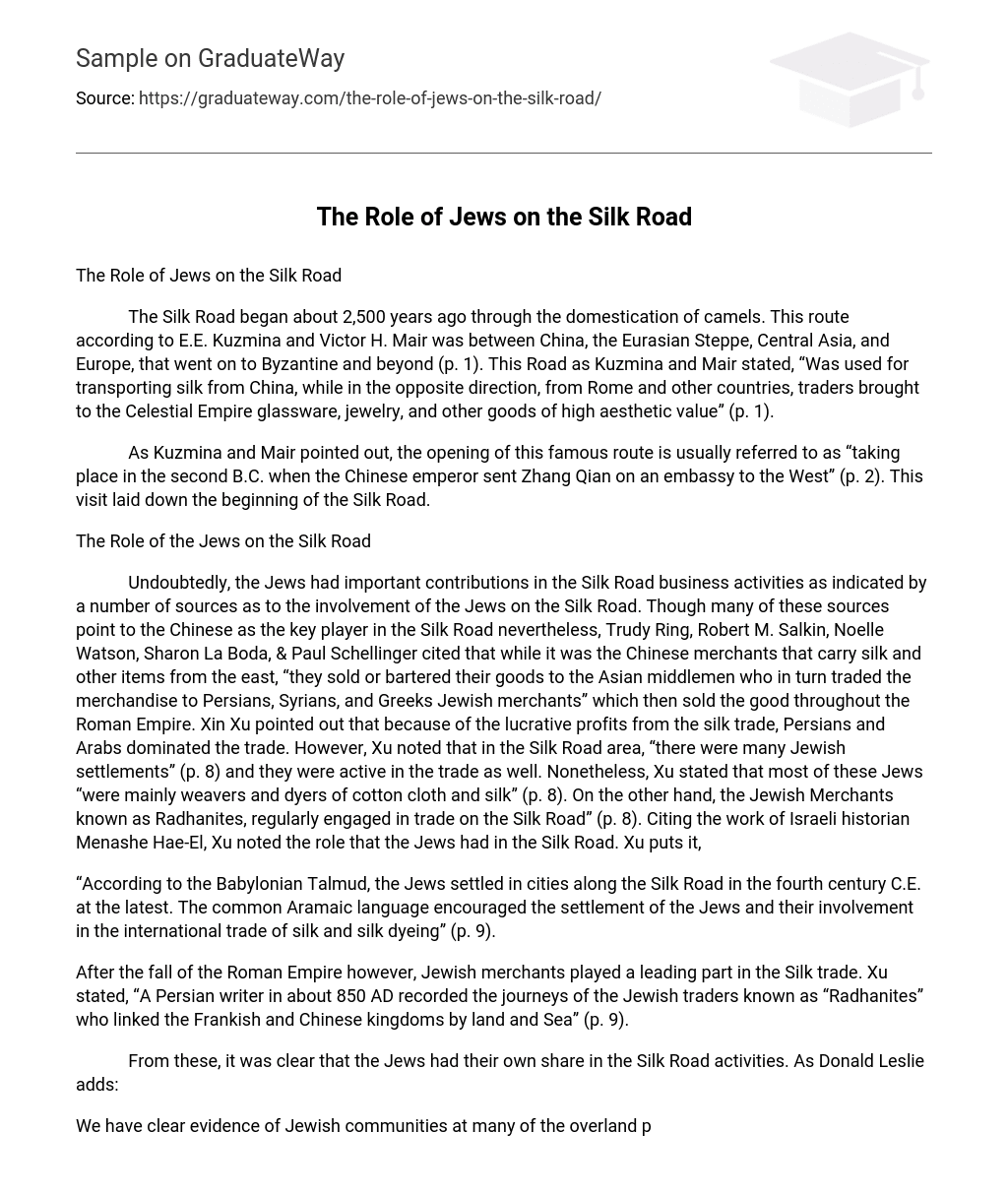The Silk Road began about 2,500 years ago through the domestication of camels. This route according to E.E. Kuzmina and Victor H. Mair was between China, the Eurasian Steppe, Central Asia, and Europe, that went on to Byzantine and beyond (p. 1). This Road as Kuzmina and Mair stated, “Was used for transporting silk from China, while in the opposite direction, from Rome and other countries, traders brought to the Celestial Empire glassware, jewelry, and other goods of high aesthetic value” (p. 1).
As Kuzmina and Mair pointed out, the opening of this famous route is usually referred to as “taking place in the second B.C. when the Chinese emperor sent Zhang Qian on an embassy to the West” (p. 2). This visit laid down the beginning of the Silk Road.
The Role of the Jews on the Silk Road
Undoubtedly, the Jews had important contributions in the Silk Road business activities as indicated by a number of sources as to the involvement of the Jews on the Silk Road. Though many of these sources point to the Chinese as the key player in the Silk Road nevertheless, Trudy Ring, Robert M. Salkin, Noelle Watson, Sharon La Boda, & Paul Schellinger cited that while it was the Chinese merchants that carry silk and other items from the east, “they sold or bartered their goods to the Asian middlemen who in turn traded the merchandise to Persians, Syrians, and Greeks Jewish merchants” which then sold the good throughout the Roman Empire. Xin Xu pointed out that because of the lucrative profits from the silk trade, Persians and Arabs dominated the trade. However, Xu noted that in the Silk Road area, “there were many Jewish settlements” (p. 8) and they were active in the trade as well. Nonetheless, Xu stated that most of these Jews “were mainly weavers and dyers of cotton cloth and silk” (p. 8). On the other hand, the Jewish Merchants known as Radhanites, regularly engaged in trade on the Silk Road” (p. 8). Citing the work of Israeli historian Menashe Hae-El, Xu noted the role that the Jews had in the Silk Road. Xu puts it,
“According to the Babylonian Talmud, the Jews settled in cities along the Silk Road in the fourth century C.E. at the latest. The common Aramaic language encouraged the settlement of the Jews and their involvement in the international trade of silk and silk dyeing” (p. 9).
After the fall of the Roman Empire however, Jewish merchants played a leading part in the Silk trade. Xu stated, “A Persian writer in about 850 AD recorded the journeys of the Jewish traders known as “Radhanites” who linked the Frankish and Chinese kingdoms by land and Sea” (p. 9).
From these, it was clear that the Jews had their own share in the Silk Road activities. As Donald Leslie adds:
We have clear evidence of Jewish communities at many of the overland posting stations as far as Khorassan, the gateway to China. That Jews joined those going further is suggested by the Judeo-Persian fragment found in Dandan Uiliq, and by the page of Hebrew prayers found in Tun Huang, both at about the 9th century. It is worth pointing… that at a time of Christian-Moslem animosity, when many trade-routs were blocked, Jews were the best equipped to carry out the trade from Asia to Europe (p. 9).
Thus, the Jewish participation in the Silk Road during this time was both as merchants and as Silk producers. The Jewish participation in the Silk Road was not only in terms of business transactions. They had also served as banker and religious mediator. Jerry Brotton argues, “The banker therefore held money or deposit for merchants and in turn established sufficient credit” (p. 47). Brotton stated that due perhaps to the growing trade in the Silk Road; there was a need for the establishment of credit system. The Jews were seen as the most qualified to handle credit transactions and act as “commercial mediators between the two religions, for the simple reasons that the Jews were free of any religious prohibition against usury (p. 47). It was there fore clear that the Jews had played an active role in the Silk Road either as merchants or as weaver, and also a banker. Karen Primack however, adds that the Jews also had other products traded at the Silk Road, such as cotton, perfume, and spices (p. 162). They became the most dominant merchants and groups of people dwelling in the area during the period.
Conclusion
The Silk Road may be identified with the Chinese merchants dealing with silk; however, it cannot be denied that the Jewish settlements in these areas had also their own shares in the business transactions occurring in this region along with Arabs and other dwellers in the area. The Silk Road like some of the most notable human achievements or development, now occupies significant pages in the annals of world’s history not only because of the significance of silk trade but also because of the extent and nature of activities done in this area. Charles Khan pointed out, “the king of Poland, Augustus the strong, offered to exchange a whole battalion of soldiers for a roomful of porcelain dishes” (p. 117). The statement seemed to be an exaggeration, or perhaps, even an exaggeration to some, but the statement indicated both the nature and the extent of business activities in this area during that period. This Silk Road however will continue to remain a legacy of the Chinese people.
Work Cited
Brotton, Jerry The Renaissance Bazar USA: Oxford University Press, 2003.
Khan, Charles World History Canada: Portahe & Main Press, 2005.
Kuzmina, E.E. & Mair, Victor The Prehistory of the Silk Road USA: University of Pennsyvania Press, 2007.
Primack, Karen Jews in Places You Never Thought of USA: KTAV Publishing House, Inc., 1998
Xu, Xin The Jews at Kaipeng, China USA: KTAV Publishing House, Inc., 2003





